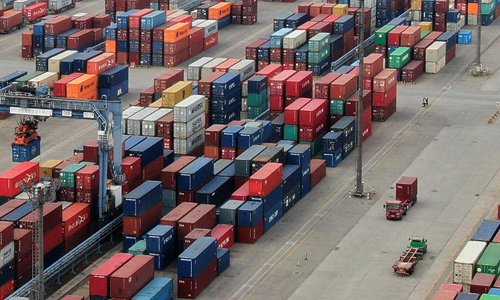HOME >> BUSINESS,SPECIAL-COVERAGE
China top contributor to global growth
By Huang Ge and Chen Qingqing Source:Global Times Published: 2019/9/24 22:53:40 Last Updated: 2019/9/25 7:46:16
Trade role, stable investment help drive local economy: experts

File photo: VCG
China, the largest contributor to global economic growth, is expected to insist on opening-up and further promote trade and investment liberalization to remain a driving force of the world economy, analysts said on Tuesday.The country is also set to play a bigger role in confronting the new challenges arising from unilateralism and protectionism, they noted.
China's economy has made significant achievements in the past 70 years, a top government official said on Tuesday.
Statistics from the early years are scant, but those available show that GDP rose 174 times to 90.03 trillion yuan ($12.66 trillion) in 2018 from 67.91 billion yuan in 1952, Ning Jizhe, vice chairman of the National Development and Reform Commission and commissioner of the National Bureau of Statistics (NBS), told a press conference on the celebration of the 70th anniversary of the founding of the People's Republic of China.
Per capita GDP rose from 119 yuan to 64,600 yuan during the same period, an increase of 70 times, Ning said.
The nation's living standards have been improving over the past 70 years. China has become the second-largest economy in the world, with the highest number of scientific researchers. It is also the largest trader of goods and has the largest foreign exchange reserves, Ning noted.
The enhancing of comprehensive national competence facilitated China's contribution to the world's economic development, which stood at 27.5 percent in 2018, up 24.4 percentage points from 1978, according to the NBS.
The country has been the leading engine of global economic growth for 13 consecutive years.
Experts attributed China's rising contribution to world economic growth to its huge trading sector, stable overseas investment and massive market vitality.
As a major trading power in the world, China's large demand for such imports as energy and agricultural products helped boost relevant exports from foreign countries, such as fruit from members of the Association of Southeast Asian Nations and mineral products from Australia, Cheng Dawei, a professor of economics at the Renmin University of China in Beijing, told the Global Times on Tuesday.
Meanwhile, China's exports of cost-effective products helped serve production and drive consumption in foreign markets. This can be seen in Europe and the US, which largely depend on China-made cheap goods, Cheng noted.
Having the most vigorous markets in the world based on its large population and rising demand, China, which is an attraction for overseas capital, also supported the vitality of the world economy, Cheng said.
China is the second-largest foreign direct investment (FDI) destination, attracting FDI worth 604 billion yuan in the first eight months of this year, up 6.9 percent year-on-year, and 27,704 foreign-funded companies were established in the nation during the period, according to data released by the Ministry of Commerce.
China's investment in foreign countries also contributed to local economic growth through bringing in tax revenue and creating employment, said Zhao Jinping, an expert from the Development Research Think Tank of China.
For instance, China has set up 82 economic and trade cooperation zones with 24 countries and regions along the routes of the Belt and Road Initiative, paying more than $2 billion in taxes to host governments and creating more than 300,000 jobs for local people, media reports said.
Larger role
China's growth is a vital part of the global economy and the key to maintaining stable economic development and boosting market confidence across the globe, Zhao said.
However, economic uncertainties and risks stemming from trade tensions between China and the US have weighed on China's economic development.
China's economic growth now faces downward pressure, China's central bank chief Yi Gang told the same meeting. "But operations are within the proper range," he said.
Yi noted that China's monetary policy should maintain its pace and seek stability, and it shouldn't flood the economy with stimulus spending.
In a bid to secure stable growth amid global economic pressure, "China should stick to its opening-up policy. It is expected to play a larger role in advancing globalization," Zhao said.
Access to banking, securities and the insurance industry has been greatly eased, and the ownership caps will be fully liberalized next year, Yi noted.
Minister of Industry and Information Technology Miao Wei said on Friday that as the world's most prosperous telecommunication market, China vowed to open the sector wider to share its growth opportunities with global enterprises.
Posted in: ECONOMY,FOCUS 70